Not-so free speech
Plus: is the UK in a debt crisis?
In today’s newsletter:
Free speech concerns reach fever pitch
Is the UK in a debt crisis?
The nonsensical energy drinks ban
Concerns about free speech have been gathering steam for some years following Covid restrictions, the ‘hate crime’ allegations against journalist Allison Pearson and the severe penalties, including the substantial period of imprisonment received by Lucy Connolly for an ill-advised tweet, imposed after the Southport riots. This week things reached fever pitch.
On Monday comedian and writer Graham Linehan was arrested at Heathrow by five armed police officers for posts on X which appear to have upset a trans activist. Up in Scotland Sandie Peggie’s tribunal case against NHS Fife for suspending her over her objections to sharing a changing room with a born-as-a-male doctor grinds on, at considerable cost to the taxpayer. Angela Rayner may have gone, but her Employment Rights Bill is reaching its Parliamentary conclusion, bringing the threat of restrictions on gossip and political repartee in pubs as employers fear tribunal cases if their staff are offended by banter. And it seems likely that we will shortly be getting an official definition of Islamophobia which amounts to a backdoor blasphemy law - despite the efforts this week by Labour peer Lord Glasman to dissuade the Prime Minister from this.
Meanwhile, across the Atlantic, Reform leader Nigel Farage warmed up for his party’s annual conference by telling the House Justice Committee about the threats which the Online Safety Act creates for free expression. Farage sees the OSA as giving ‘extraordinary and arbitrary powers’ to Ofcom, the UK regulator which is rapidly growing too big for its boots. These powers, which the Institute of Economic Affairs has long warned about, are being used to censor output and to impose access restrictions which go way beyond the stated purpose of protecting young and/or vulnerable people from measurable harm.
Farage’s Washington trip reflects a real concern on the other side of the Atlantic about where Britain, long held up – maybe debatably, given our long history of censorship - as the origin of the Free Speech traditions which the USA holds so dear, is heading. This concern has economic as well as political dimensions, for excessive restrictions on what can be said or advertised on social media and other platforms restricts trade, increases costs and could lead to retaliatory sanctions which would damage our already fragile economy. Maybe we need our own First Amendment as an ironic reexport from the Land of the Free.
A few years back I edited a book on Free Speech for the IEA which showed growing concern on a range of other issues, including hate laws, restrictions on prayer, ‘cancelled’ comedy (a lively piece by GB News’s Leo Kearse), advertising bans, university activism and ‘extreme’ speech. It's worth reading again as the Speech Wars ratchet up a few more notches.
Len Shackleton
Editorial and Research Fellow
The best way to never miss out on IEA work, get access to exclusive content, and support our research and educational programmes is to become a paid IEA Insider.
IEA Podcast: Executive Director Tom Clougherty, Editorial Director Kristian Niemietz and Managing Editor Daniel Freeman discuss the UK’s fiscal situation, the collapse of house-building in London, and freedom of speech — IEA YouTube
Is the UK in a debt crisis?
Economics Fellow Julian Jessop writes in the Spectator this week about causes and consequences of rising borrowing costs:
“The cost of new government borrowing for ten years is now around 4.7 per cent in the UK, compared to 4.2 per cent in the US, around 3.5 per cent in France, Italy and Canada, 2.7 per cent in Germany, and just 1.6 per cent in Japan…
“There are three main reasons why UK borrowing costs are such an outlier. First, international investors have lost confidence in the UK government’s willingness to take tough decisions to bring borrowing down, especially after the recent failures to curb welfare spending…
“Second, the Bank of England is actively selling government bonds, reversing the previous policy known as ‘Quantitative Easing’ (QE) and it is doing so more aggressively than other central banks…
“Third, there are fears that higher UK inflation will keep official interest rates higher for longer too, while adding to the cost of inflation index-linked borrowing (of which the UK has a relatively large amount)…
“This does not mean that a UK debt crisis is imminent, or even inevitable…”
News and Views
The Building Crisis Destroying Britain, Director of Communications Callum Price interviews Sam Richards, CEO of Britain Remade, IEA YouTube
“We need more growth. We need less government spending. That is the way to fix the public finances.” Economics Fellow Julian Jessop speaks to GBNews
Should workers be entitled to ‘digital downtime’? Callum Price says no, CityAM
“Employee rights do not come free. Enforcing their delivery and proving their compliance all add costs to employers. And that’s before you take into account the potential cost of the right itself – in this case having an entire workforce go dark for periods during the workday. The government has clearly proven it is not shy about mounting costs on businesses, with their minimum wage rise, employers’ National Insurance contributions hikes and forthcoming Employment Rights Bill.”
Graham Linehan’s arrest shows we need a UK First Amendment, Reem Ibrahim argues in Spiked
“The First Amendment to the US Constitution protects the right to freedom of expression from government censorship. Had Graham Linehan, Lucy Connolly and Britain’s countless other speech criminals said what they said across the pond, they would never have been put in cuffs.”
Britain Blackout: Can Renewables Keep the Lights On? Energy Analyst Andy Mayer interviews energy expert Kathryn Porter for Free the Power, IEA YouTube
Are we going to start banning all sugary drinks for children? Head of Media Reem Ibrahim on the energy drinks ban, TalkTV
“It would be madness to rely solely on tax hikes to fill the black hole in the public finances.” Julian Jessop on the challenge facing the Chancellor, The Sun
Kids’ caffeine cancelled, Reem Ibrahim discusses the nonsensical energy drinks ban with Jacob Rees-Mogg, GB News
Between The Waves — Britain’s post-empire problem with Europe, the IEA is referenced in a review of a new book by Tom McTague on Britain and Europe, Financial Times
IEA at Reform Party Conference 2025
Is climate realism inevitable?, COO & Energy Analyst Andy Mayer spoke on a panel on the future of energy policy.
Politics and Prohibition: The Fight for Choice, Head of Lifestyle Economics Chris Snowdon discussed the importance of consumer choice.
What could Reform’s economic policies look like?, Head of Media Reem Ibrahim was interviewed by Tom Harwood to discuss the economic challenges a potential Reform Government could face, GB News





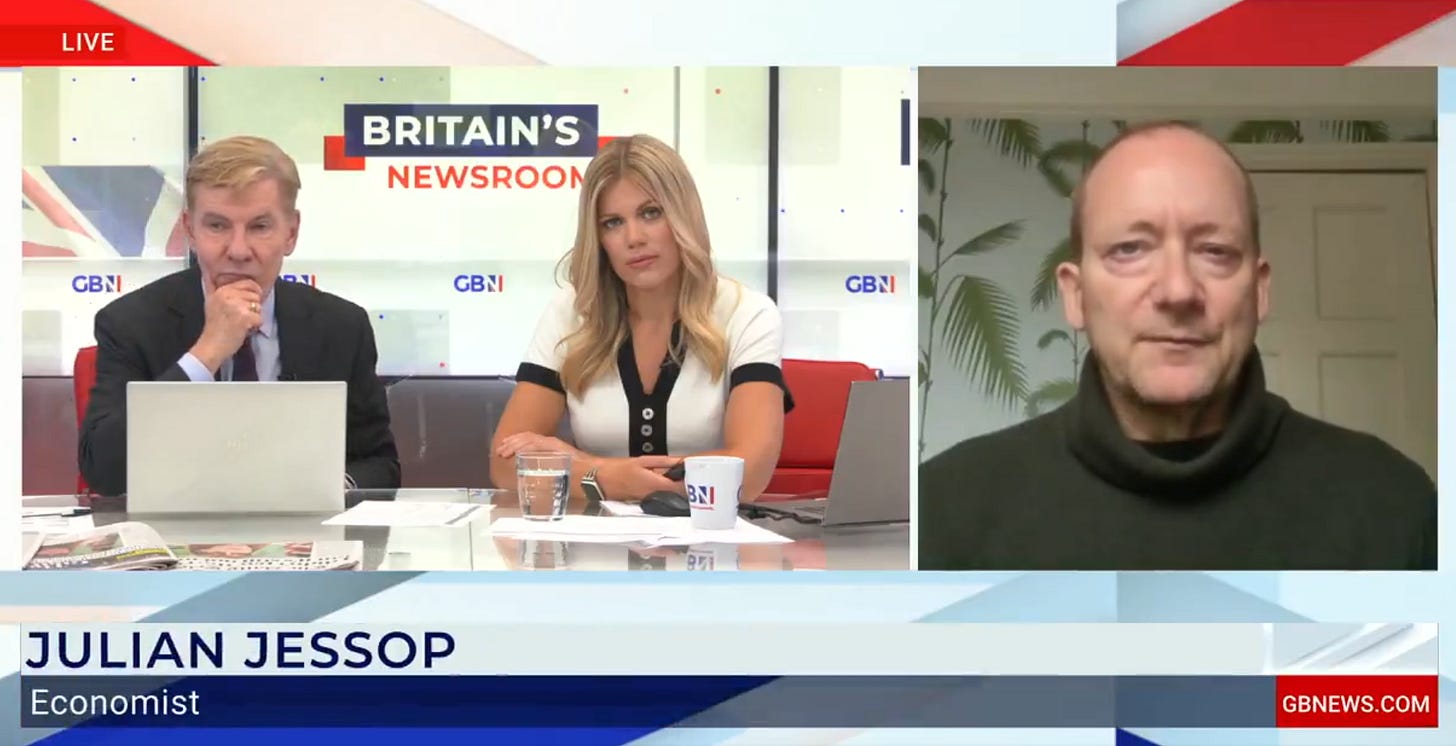
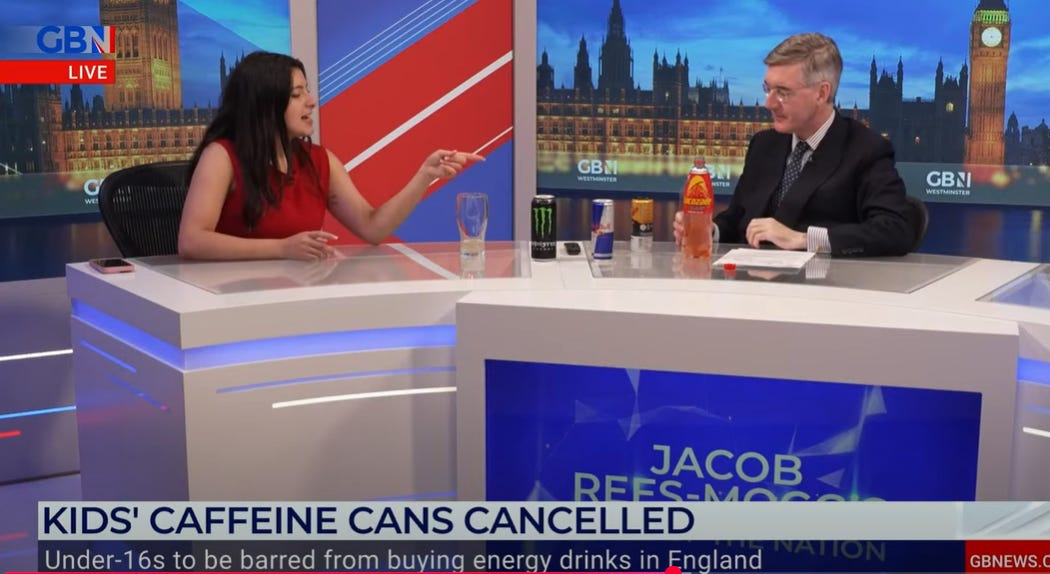
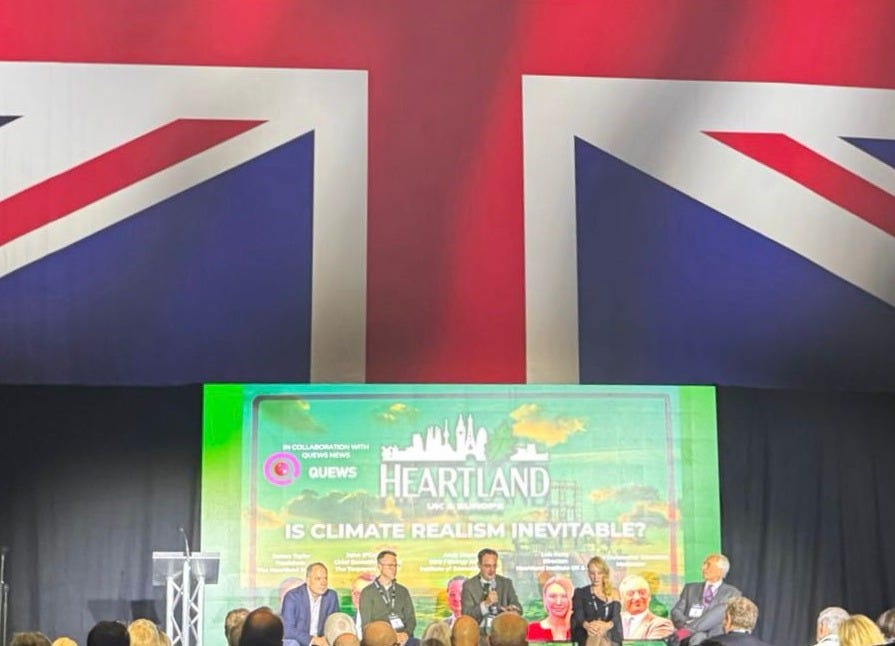
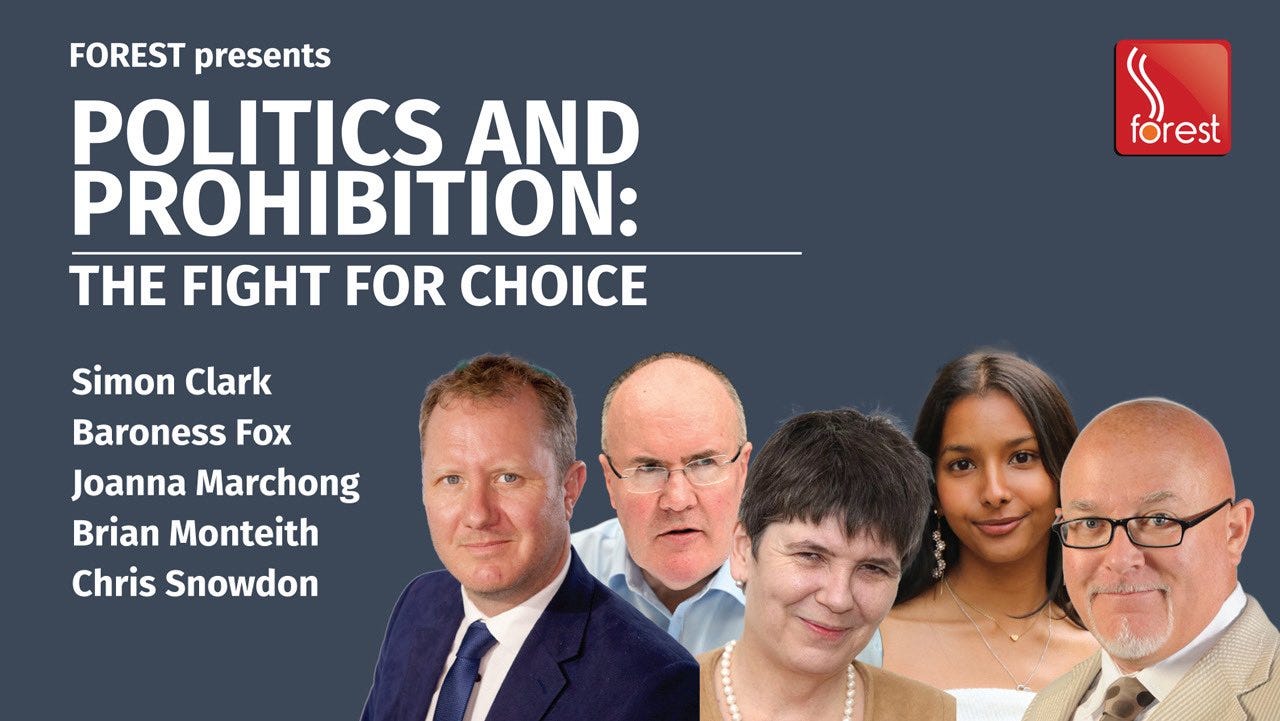
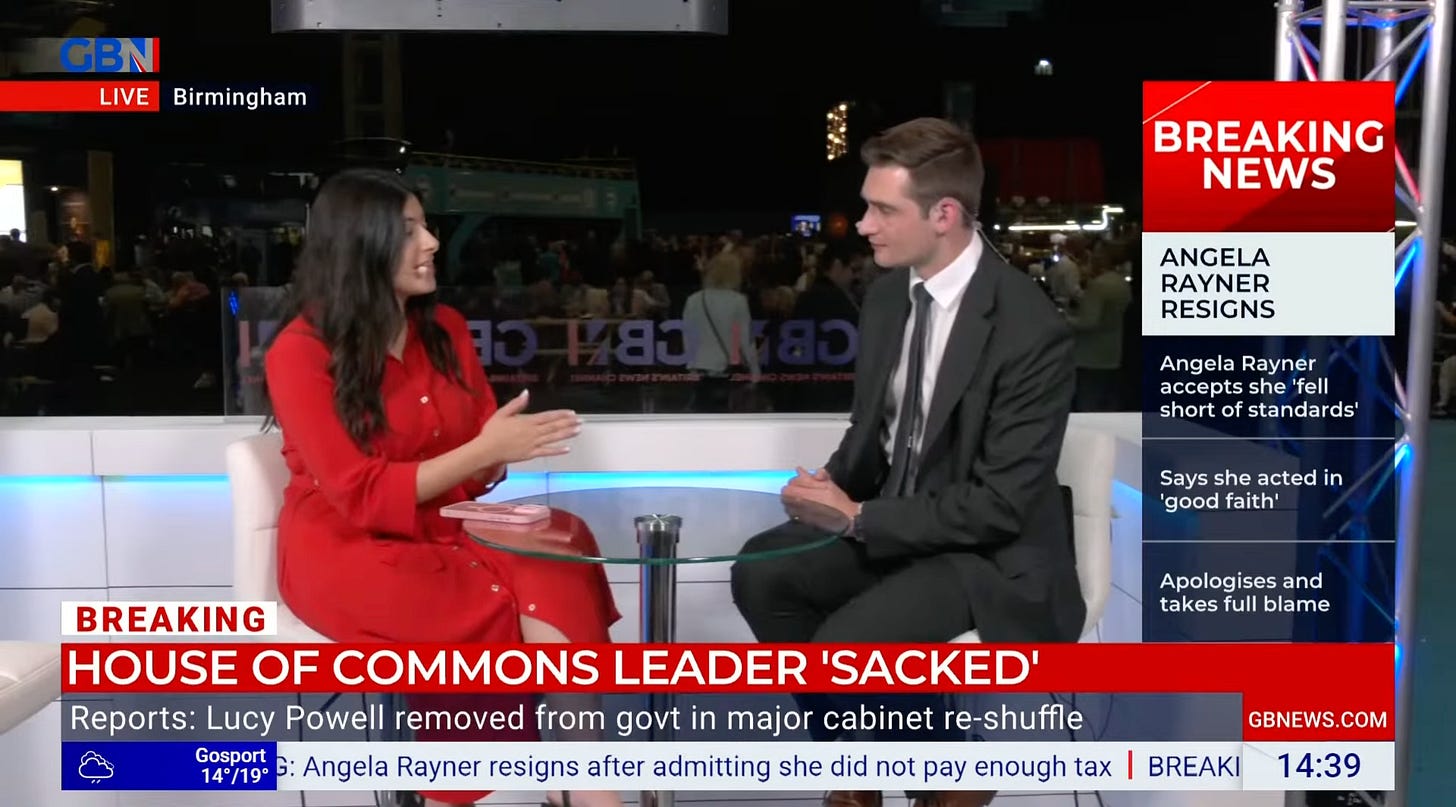

Great podcast chaps. Very interesting views and comments. We do have free speech. But we are guilty of abusing that privilege. Yes, I agree it should be a stated right to speak freely and without prosecution. But we know that we can’t have that right. There is always a balance between that privilege and right against the constant pushing of hatred and adverse unwanted and corrosive speech. I recently replied to an earlier IEA podcast, in which I reminded you that, the recent in line bill was in response to children getting pushed into suicide or accessing pornography and I explained for those reasons alone we must protect our children. That is not overreach. Hateful and harmful tweets or said in any publication are subject to rules, regulations and laws. Our society is not free. We are bound by collective civil and reasonable actions that are acceptable. Unacceptable association of any outlawed terrorist movement must be in those crosshairs of acceptability. The free right to speech is and must be tempered. Otherwise anarchy will follow. I don’t think we have reached the top dead centre of the ‘Laffer Curve’ on overreach just yet. Further movement towards that may be ahead. But to whip up and use such a bill that protects our children should never be used as an example of overreach. However, I don’t think you are seeing beyond the obvious here in relation to the arrest of that comedian. I think it’s much more nuanced than the obvious. I have come to learn that when an argument kicks off and words are exchanged, the words being shouted are not what has caused the argument. The words are expressing something obvious, but the real reasons are not so obvious. For whatever reason, they can’t be said or font want to be said, so the argument ensues for the wrong reason. You have to find the hidden underlying cause and not the symptom. So on first glance this is an atrocious waste of time and resources. But the Police are trying , in my view, to be political. I can remember seeing PM May going as Home Secretary to the Police union conference and castigated them for poor results. Silence was deafening . And ever since then I have noticed this style of overkill to highlight the stupidity of legislation. In a way only the Police can. Their problems as are ours is all due to UNDERFUNDING! But the Police can’t be political. They have to follow the law as laid down. So I see a sort of ‘work to rule’. To highlight the craziness of having to chase tweets rather than real villains. So they take pride in making the politicians look embarrassed and having to justify their own laid laws. So yes, for a comedian and celebrity they will send 5 armed officers to arrest him off the plane. I’m sure it’s meant to be. Yes, the Police can individually do the worst of crimes. But collectively time and time again this is for show. This is meant. It’s planned and authorised. You can’t be that naive to think the orders weren’t given from high up. This has happened before. It’s a political statement by making a law look stupid. This brings me nearly to the underfunding we have all had to put up with. Thatcher, took us from a powerful oil gas nuclear and coal economy and one with heavy industry to a device and finance economy of pen-pushers. She took out all the industry’s that led to the troubles of the seventies. By selling off or closing or underfunding all the problem industry causing her headaches to run. And in so doing sold off all our family silver. Wrongly thinking that private sector running will end the strife and be well run. Well here we are. No power stations, water company’s taking money with no investment. Sky high gas and electric prices and a government underfunded. It’s been a total disaster. We have never had it good! When you think it can’t get worse, it does. When it does you think it wasn’t so bad before, but it was! And everyone is deluded. To think 25 years of borrowing our own money back with services that have never been properly funded we are at breaking point. And I think we are at a crossroads. Do we have a small state with no services and poor hospitals and awful services or do we want world class world leading services with high care and wages? Because a small state cares not. It won’t afford it. Only a big state can give us everything. You get what you pay for. Are you a Thatcher who wants to run the country without running anything and paying for nothing? If do you want a society that can afford anything and everything? That’s what both choices give you. Small state small taxes small help small obligation. Or big state, paid for with one tax every help and real care? We can have either or? But to keep suggesting we have really funded anything properly makes no sense to me. We may have increased budgets on day the nhs but, in reality we have never funded it properly. In fact we haven’t funded anything properly. Wherever you look, it’s successive governments of all colour and wing that have presided over an underfunded society. To expect people to work twice as hard for half the price is ridiculous. Look around you! Hospitals crumbling, roads that we can’t even fill the potholes. Schools with RAC Crumbling, no planes on our carriers no power stations, reservoirs and a depleting army. And what are we world leaders in? Ignorance! That’s what. We ignore the bloody obvious. Nearly all our money isn’t in our economy from which we pay tax! It’s not being used for our benefit. I’m all for people earning stupid sums of money. If 60,000 people want to watch footballers much a ball and oat £100 each, fine! But unless that money comes back around again the whole system shudders under the strain of underfunding. What planet are they all on? If they allow nearly all our money to be held outside our daily economy how do they expect our economy to provide sufficient revenue to afford the taxes we need to break even, let alone properly fund the police, pensions the army the navy the air force, power stations roads, rail, water, services of an nature we need!? Part of our underfunded government is Councils. Which is a Segway to your other headache , planning! Councils have been underfunded. So they look for any old way to get money. Part of this is planning. I’m sure they avoid being part of any application so they can say no! Saying no means more work for them and more money in application. They draw it out to give them jobs and power. And you are right, they say no because they can and not because they should. Of course they should be an active part to the application from the start. Saying what can be done not wait to decline it. Make sure they work with the applicant to make it work! It’s common sense isn’t it? Don’t let them fail anything, make all pass!! But it’s another symptom of societal underfunding. We have to take the path to making the tax cover our needs. Not cut the services to what we think we can only afford. We’ve not been borrowing to make our lives better. We’ve been borrowing just to allow the mega rich hang on to our money for longer! It’s madness. We can now make the framework to insist money is spent not held onto. I’ve written about this many times. We can make all or most of the money be spent back by using digital money. Making us all richer including the rich! It’s a no brainer! Stop looking in the wrong direction. Look at where the money is when it’s not in our daily economy. It’s said that there is £19 trillion pounds out there in the aether. We get tax income if done £1.1 trillion pounds. Thats 5% or so of our possible money. Just 5% of all our money is tax income. That tells me, that only a small part of our money is in the tax paying system. We are trying to run a nation on just 5% of tax revenue. It’s so bloody simple guys. Get all that money moving and we’ll all be rich!